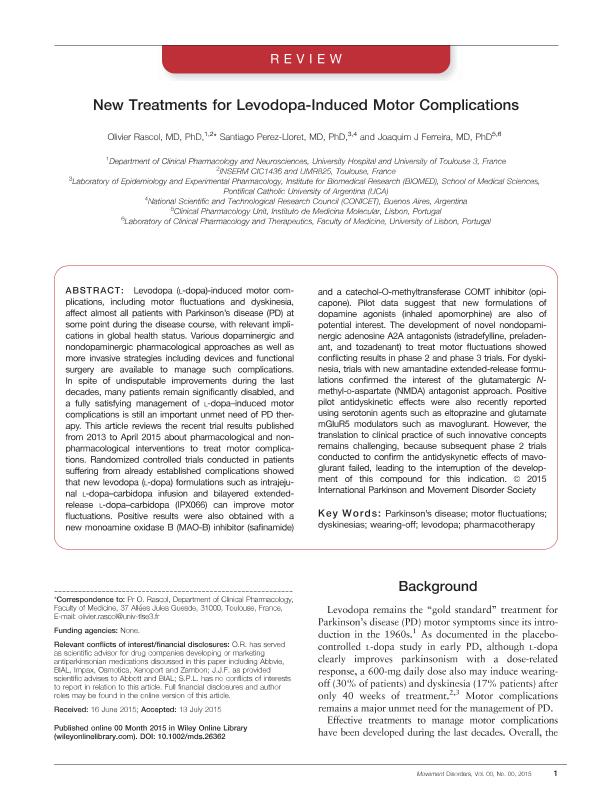Mostrar el registro sencillo del ítem
dc.contributor.author
Rascol, Olivier

dc.contributor.author
Pérez Lloret, Santiago

dc.contributor.author
Ferreira, Joaquim
dc.date.available
2018-03-14T20:18:35Z
dc.date.issued
2015-09
dc.identifier.citation
Rascol, Olivier; Pérez Lloret, Santiago; Ferreira, Joaquim; New treatments for levodopa-induced motor complications; Wiley; Movement Disorders; 30; 11; 9-2015; 1451-1460
dc.identifier.issn
0885-3185
dc.identifier.uri
http://hdl.handle.net/11336/38805
dc.description.abstract
Levodopa (l-dopa)-induced motor complications, including motor fluctuations and dyskinesia, affect almost all patients with Parkinson's disease (PD) at some point during the disease course, with relevant implications in global health status. Various dopaminergic and nondopaminergic pharmacological approaches as well as more invasive strategies including devices and functional surgery are available to manage such complications. In spite of undisputable improvements during the last decades, many patients remain significantly disabled, and a fully satisfying management of l-dopa-induced motor complications is still an important unmet need of PD therapy. This article reviews the recent trial results published from 2013 to April 2015 about pharmacological and nonpharmacological interventions to treat motor complications. Randomized controlled trials conducted in patients suffering from already established complications showed that new levodopa (l-dopa) formulations such as intrajejunal l-dopa-carbidopa infusion and bilayered extended-release l-dopa-carbidopa (IPX066) can improve motor fluctuations. Positive results were also obtained with a new monoamine oxidase B (MAO-B) inhibitor (safinamide) and a catechol-O-methyltransferase COMT inhibitor (opicapone). Pilot data suggest that new formulations of dopamine agonists (inhaled apomorphine) are also of potential interest. The development of novel nondopaminergic adenosine A2A antagonists (istradefylline, preladenant, and tozadenant) to treat motor fluctuations showed conflicting results in phase 2 and phase 3 trials. For dyskinesia, trials with new amantadine extended-release formulations confirmed the interest of the glutamatergic N-methyl-d-aspartate (NMDA) antagonist approach. Positive pilot antidyskinetic effects were also recently reported using serotonin agents such as eltoprazine and glutamate mGluR5 modulators such as mavoglurant. However, the translation to clinical practice of such innovative concepts remains challenging, because subsequent phase 2 trials conducted to confirm the antidyskynetic effects of mavoglurant failed, leading to the interruption of the development of this compound for this indication.
dc.format
application/pdf
dc.language.iso
eng
dc.publisher
Wiley

dc.rights
info:eu-repo/semantics/openAccess
dc.rights.uri
https://creativecommons.org/licenses/by-nc-sa/2.5/ar/
dc.subject
Enfermeda de Parkinson
dc.subject
Complicaciones Motoras
dc.subject
Tratamiento
dc.subject.classification
Medicina Critica y de Emergencia

dc.subject.classification
Medicina Clínica

dc.subject.classification
CIENCIAS MÉDICAS Y DE LA SALUD

dc.title
New treatments for levodopa-induced motor complications
dc.type
info:eu-repo/semantics/article
dc.type
info:ar-repo/semantics/artículo
dc.type
info:eu-repo/semantics/publishedVersion
dc.date.updated
2018-03-13T13:58:57Z
dc.journal.volume
30
dc.journal.number
11
dc.journal.pagination
1451-1460
dc.journal.pais
Estados Unidos

dc.journal.ciudad
Nueva York
dc.description.fil
Fil: Rascol, Olivier. Universite de Toulose - Le Mirail; Francia. Inserm; Francia
dc.description.fil
Fil: Pérez Lloret, Santiago. Pontificia Universidad Católica Argentina "Santa María de los Buenos Aires". Instituto de Investigaciones Biomédicas. Consejo Nacional de Investigaciones Científicas y Técnicas. Oficina de Coordinación Administrativa Houssay. Instituto de Investigaciones Biomédicas; Argentina
dc.description.fil
Fil: Ferreira, Joaquim. Instituto de Medicina Molecular; Portugal. Universidade de Lisboa; Portugal
dc.journal.title
Movement Disorders

dc.relation.alternativeid
info:eu-repo/semantics/altIdentifier/url/http://onlinelibrary.wiley.com/doi/10.1002/mds.26362/full
dc.relation.alternativeid
info:eu-repo/semantics/altIdentifier/doi/http://dx.doi.org/10.1002/mds.26362
Archivos asociados
